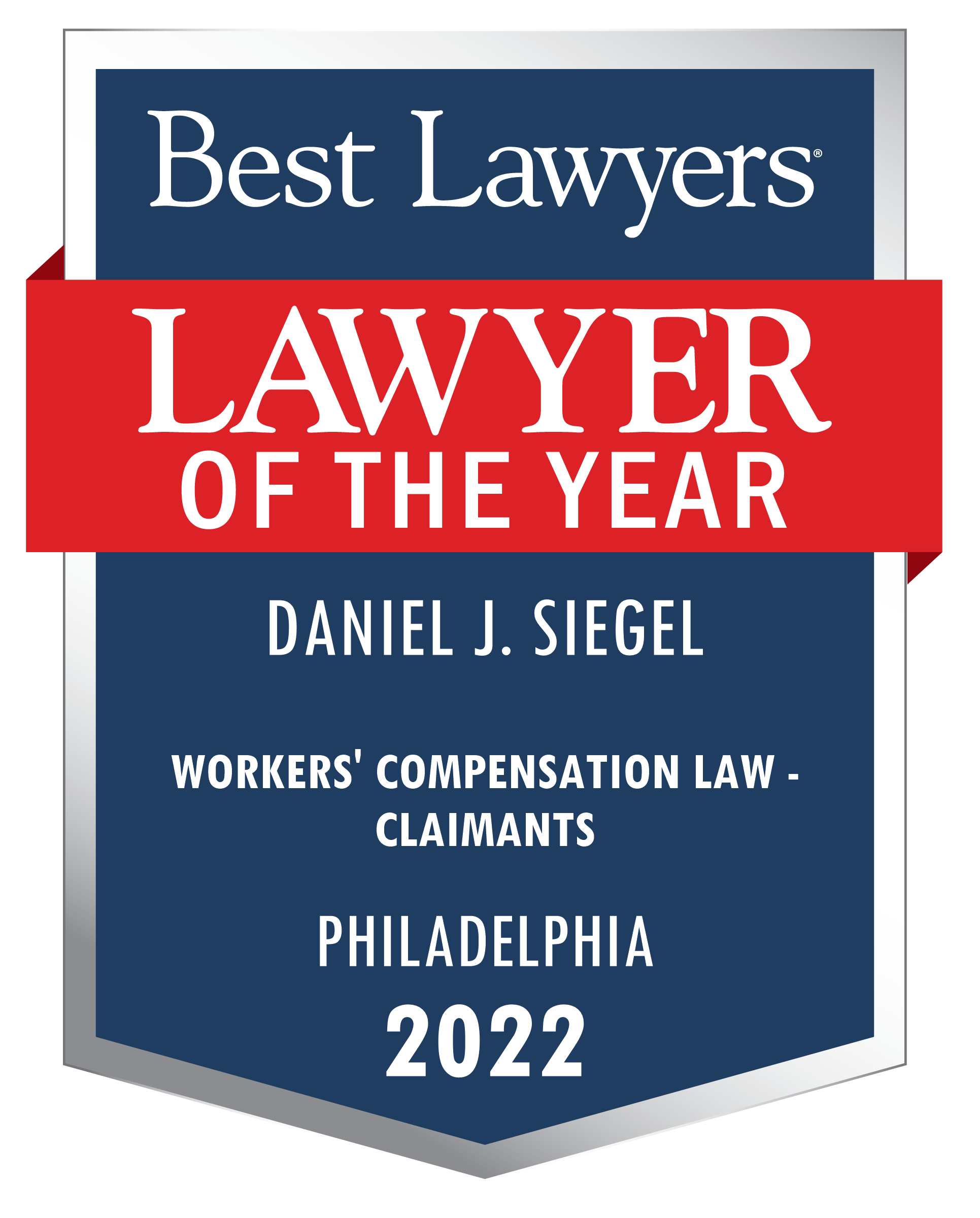Results – Our Cases Change the Law
Cases That Change The Law – A Record of Results That Help Accident Victims & Protect Rights
Other law firms follow the leaders. We are The leaders. Attorney Daniel J. Siegel’s precedent-setting Workers’ Compensation and personal injury cases have assured or increased the benefits of more injured persons than any law firm in Pennsylvania. We have fought to protect and expand the rights of injured workers and other victims of negligence (including car accidents, slip and falls and other catastrophic injuries) for over three decades. We recognize that every case is different and settle cases that should settle (even when other firms can’t), take cases to trial that cannot settle and fight on Appeal to the Pennsylvania Supreme court to assure that our clients are fully compensated for their injuries. a sample of cases that highlight our successful record:
Feleccia v. Lackawanna College (2019) – The Pennsylvania Supreme Court ruled for the first time that an exculpatory release that attempts to release gross negligence is invalid and unenforceable. The Court also affirmed that when a party, in this case a college, undertakes a duty to provide qualified trainers at a practice, it must do so in a manner that is reasonable under The circumstances. Watch Daniel J. Siegel’s oral argument Before The Pennsylvania Supreme court.
“The credit properly goes to [Daniel J. Siegel] as counsel for appellees for developing in-depth arguments about the controlling statutes and regulations, the college’s voluntary undertaking to provide certified athletic trainers and the ample evidence of its recklessness and grossly negligent violation of that undertaking.” – Attorney
Armour Pharmacy v. Bureau of Workers’ Compensation Fee Review Hearing Office (2019) – The Commonwealth Court of Pennsylvania ruled that Workers’ Compensation settlements cannot eliminate the rights of medical providers unless they are able to participate in the proceeding. This decision, like most of our cases, will impact every Pennsylvania Workers’ Compensation settlement and prevent Insurance companies from unscrupulously taking advantage of medical providers. Click here to read The court’s Opinion.
Protz v. Workers’ Compensation Appeal Board (Derry Area School District) (2017) – The Pennsylvania Supreme Court ruled that the Pennsylvania Workers’ Compensation Act’s Impairment Rating examination violated the Pennsylvania Constitution. by declaring this provision unconstitutional, the Supreme court invalidated the arbitrary 500-week limit on wage losses that reduced the rights of the overwhelming majority of injured Workers. Daniel J. Siegel authored the friend of the court brief on behalf of the Pennsylvania Association for Justice.
Erie Insurance v. Bristol (2016) – The Pennsylvania Supreme Court extended the deadline (statute of limitations) for filing Claims by underinsured motorists. Before this decision, the deadline for filing these Claims was dramatically and arbitrarily limited. Watch Daniel J. Siegel’s oral argument before the Pennsylvania Supreme court.
Verizon Pennsylvania Inc. v. Workers’ Compensation Appeal Board (Ketterer) (2014) – The Pennsylvania Commonwealth Court ruled that a physician must have an active clinical practice, i.e., the physician must provide preventive care and the evaluation, treatment and management of medical conditions, at least 20 hours per week, in order to be qualified to perform Impairment Rating Evaluations under Section 306(a.2)(1) of the Workers’ Compensation Act, 77 P.S. § 551.2(1).
Barnes v. Keller (2012) – The Pennsylvania Superior Court held that a jetter attached to a cargo van could be a “Motor vehicle” under the Motor vehicle Financial Responsibility law, and disapproved of the fact that the trial judge failed to disclose that his spouse was employed as an attorney by the law firm representing The appellee.
Commonwealth v. Workers’ Compensation Appeal Board (Harvey) (2010) – The Pennsylvania Supreme Court affirmed the use of actuarial data to calculate pension offsets for injured employees who also receive pension benefits from a defined benefit plan. by not foreclosing a claimant’s ability to challenge the calculations and the assumptions underlying them, injured Workers may still employ actuaries to establish when improper and inaccurate calculations form the basis for a claimed offset.
Philadelphia Gas Works v. Workers’ Compensation Appeal Board (Amodei) (2009) – The Pennsylvania Commonwealth Court held that when an employer seeks an offset from Workers’ Compensation benefits for pension benefits paid to an injured employee, the offset must be calculated based upon the net amount of the benefits received by the worker.
Thorne v. Miller (1998) – This is the first reported case in New Jersey to address the obligation of a driver who waves or signals another vehicle into traffic. The trial court held that a driver who waves to another driver to proceed is under a duty of reasonable care that, at the least, requires the driver who waved to observe whether traffic conditions were such as to allow The other driver to proceed without accident; whether, in this case, the waving driver breached that duty and whether the breach was a proximate cause of the accident is for the jury.
Smith v. Pulcinella (1995) – The Pennsylvania Superior Court extended to general Negligence cases the malpractice doctrine that, where the conduct of two or more tortfeasors causes an injury, and the damages cannot be reasonably apportioned among the negligent parties, any one of the tortfeasors may be held responsible for the entire verdict if that party’s Negligence was a substantial contributing factor in causing the plaintiff’s injuries.
Curran v. Greate Bay Hotel & Casino (1994) – The Pennsylvania Superior Court ruled when a verdict may be reduced under the Comparative Negligence Act, and also held that the failure to request the correction of an inconsistent jury verdict constitutes a waiver of any objection to The verdict.
Denny’s v. Workmen’s Compensation Appeal Board (Stanton) (1991) – The Pennsylvania Commonwealth Court specified which actions by employees are in furtherance of an employer’s business, thus requiring an employer to provide worker’s Compensation benefits to employees injured under The circumstances.
Walsh v. City of Philadelphia (1991) – The Pennsylvania Supreme Court defined the nature of permissible Claims against municipalities under the Recreational Use of Land and Water Act, and outlined the standard for the types of injuries for which local governmental bodies are responsible for damages under the Political Subdivision Tort Claims Act.
Insurance companies know that we will fight – and win – cases, no matter how hard the battle. That’s why they often settle with us for greater amounts to avoid the appeal.
To see how we can help you, call (610) 446-3457 or click here to send us an email.







